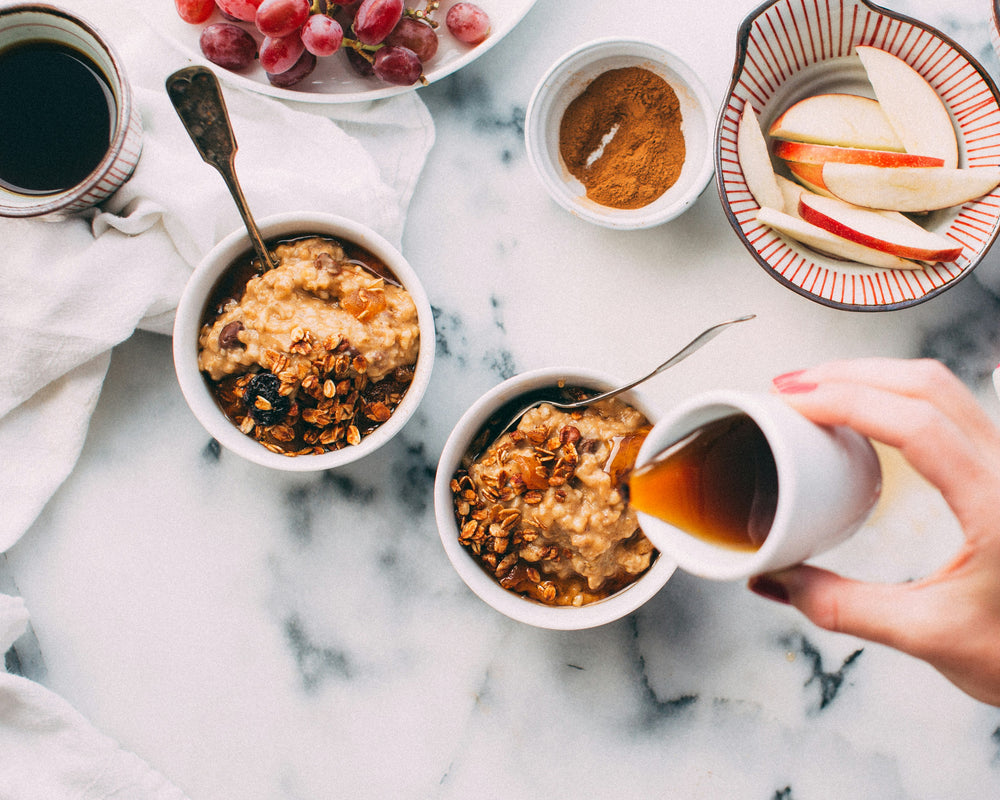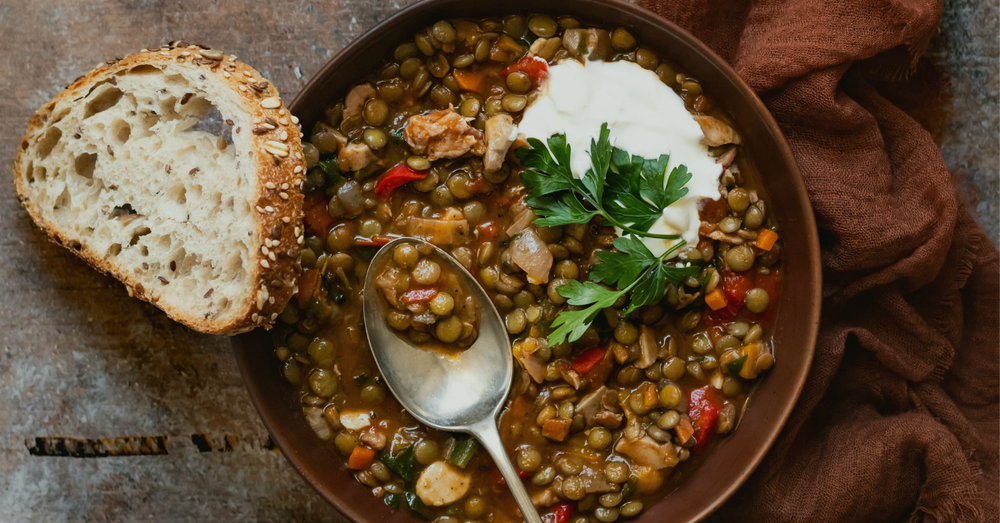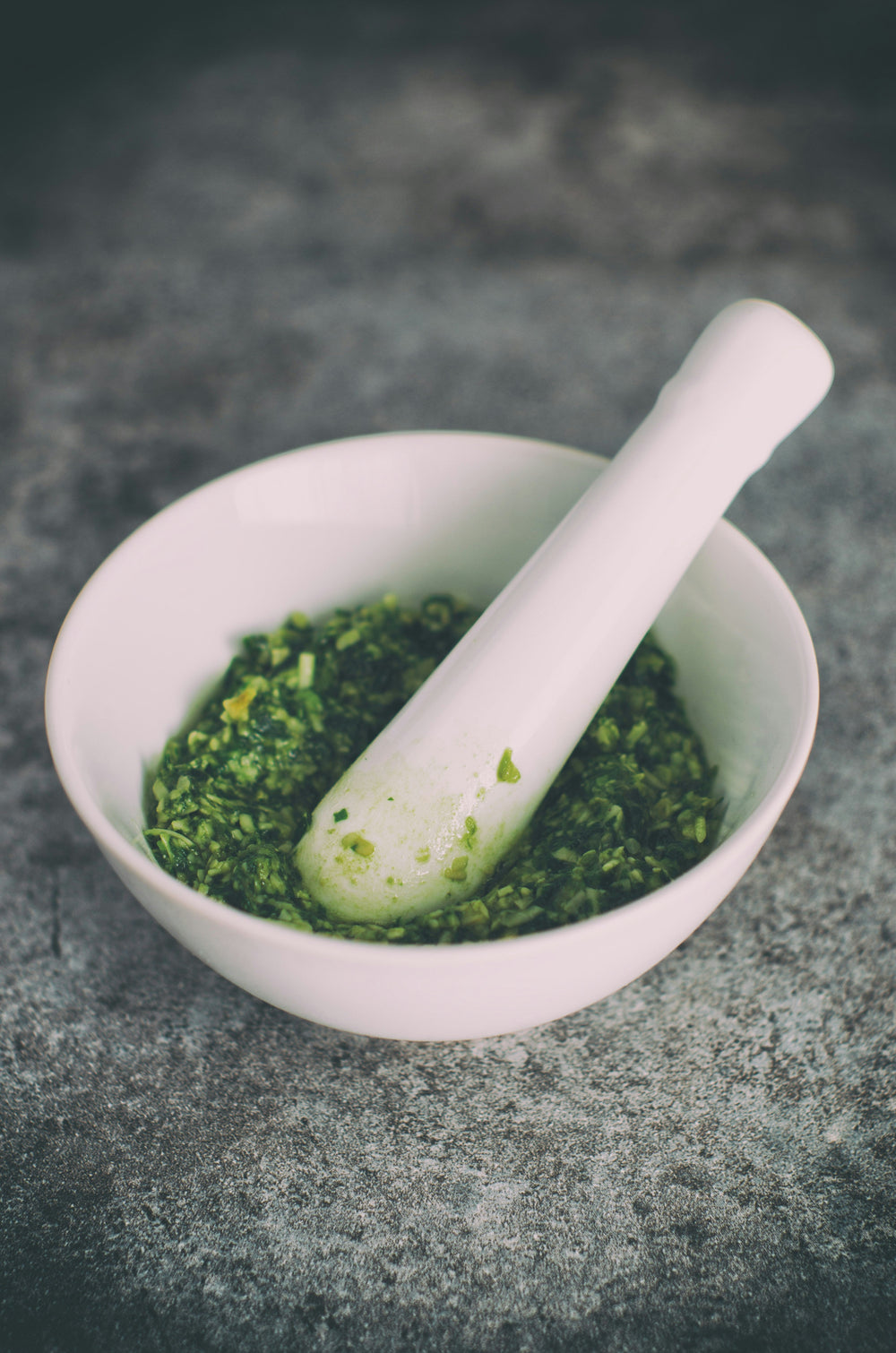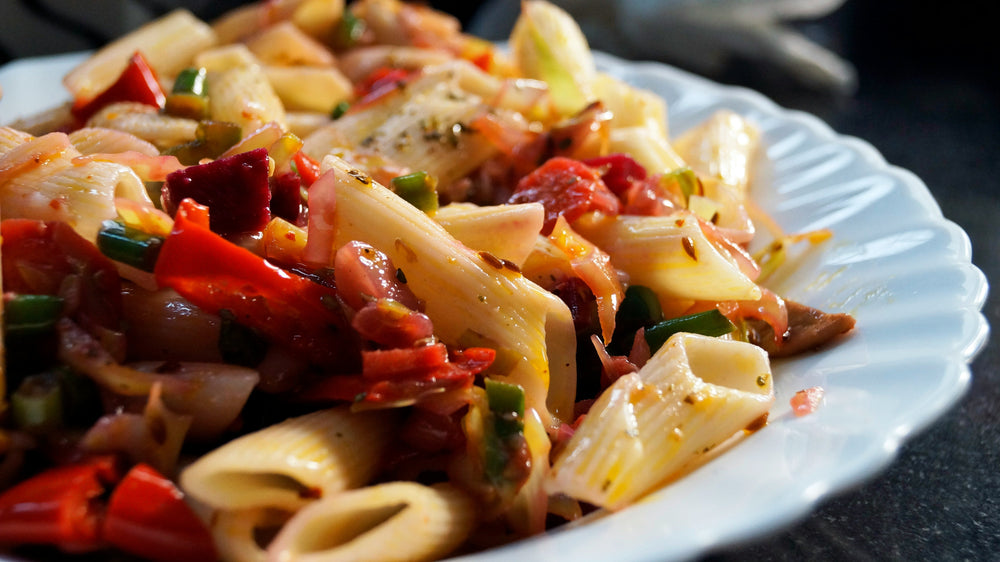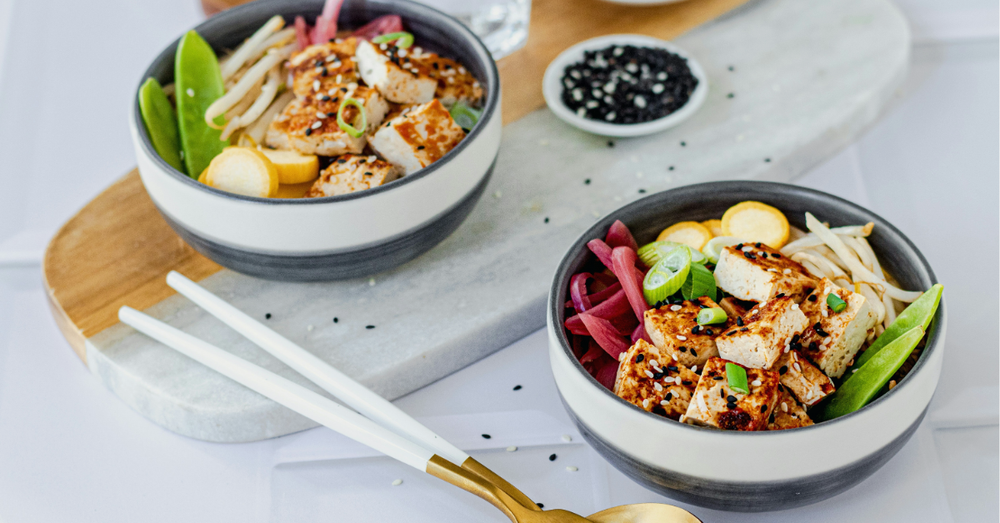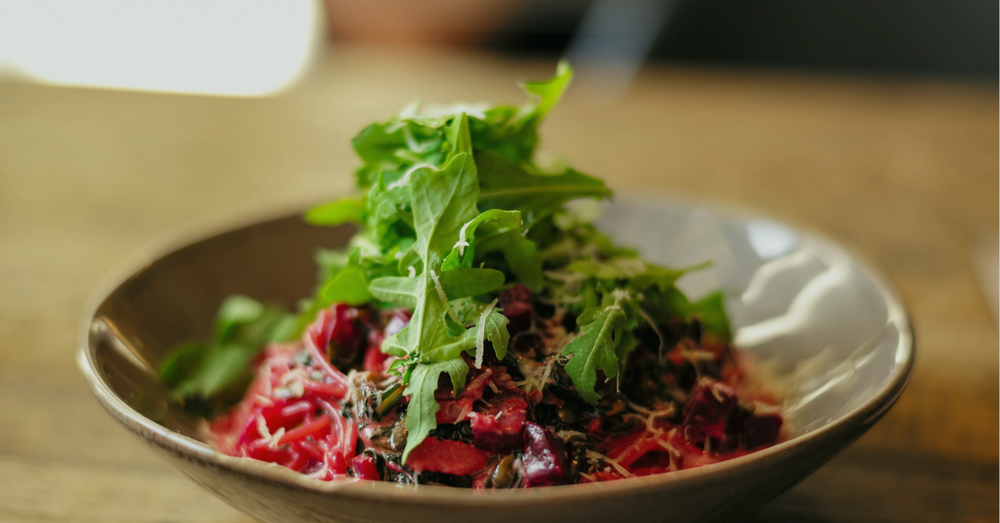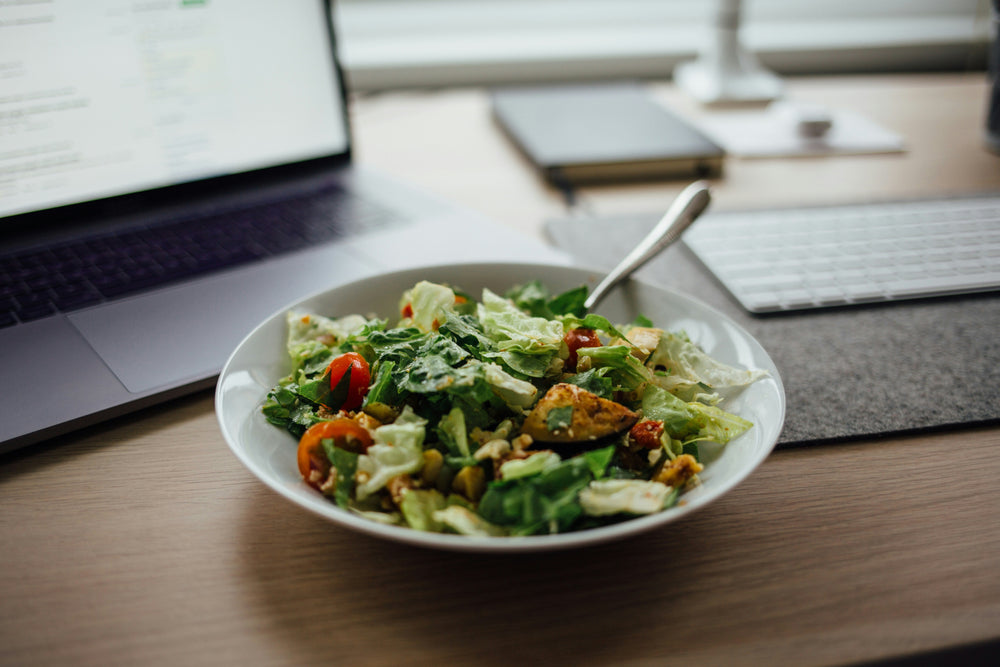This creamy green soup brings together broccoli, cauliflower, and kale for a delicious bowl that feels both comforting and energising. Finished with crispy chickpeas and toasted almonds, it is an easy way to enjoy a whole day’s worth of greens in one simple, nourishing meal.
why do you get constipated? common reasons and what to do.
Understanding Constipation: What’s Really Happening in Your Gut Constipation is something most of us will experience at some point. In fact, around 10–15% of adults worldwide live with it at any given time and is often a sign that your digestion isn’t working as smoothly as it could. What’s Going On Inside? Your gut is designed to move things along. The walls of your intestines contract gently and rhythmically to push waste through which is called motility, meaning movement. When this slows down, stool spends longer in the colon. The longer it stays there, the more water is reabsorbed, leaving stool hard, dry, and difficult to pass. Doctors usually describe constipation as fewer than three bowel movements per week, or straining to pass stool even when you feel the urge. The Different Types of Constipation Not all constipation is the same, and understanding the type can make a difference when it comes to support options. Functional constipation – the most common type, where bowel movements are infrequent or difficult but there’s no underlying disease. This is also the form most often studied with supplements. Slow-transit constipation – here, the colon moves waste along more slowly than usual. There are also pelvic floor dysfunction (when the muscles used to pass stool don’t coordinate properly) and secondary constipation (caused by another condition such as diabetes, thyroid problems, or side effects of medicines) but these require medical management first. Why Does Constipation Happen? Constipation is often the result of a combination of factors, including: Travel or changes in routine – disrupting your body’s rhythm. Stress – the gut and brain are closely linked, so emotional stress can affect digestion Dehydration – not enough fluid makes stool firmer. Low fibre intake – fibre bulks and softens stool. Lack of exercise – sitting for long...

Understanding Constipation: What’s Really Happening in Your Gut
Constipation is something most of us will experience at some point. In fact, around 10–15% of adults worldwide live with it at any given time and is often a sign that your digestion isn’t working as smoothly as it could.
What’s Going On Inside?
Your gut is designed to move things along. The walls of your intestines contract gently and rhythmically to push waste through which is called motility, meaning movement. When this slows down, stool spends longer in the colon. The longer it stays there, the more water is reabsorbed, leaving stool hard, dry, and difficult to pass.
Doctors usually describe constipation as fewer than three bowel movements per week, or straining to pass stool even when you feel the urge.
The Different Types of Constipation
Not all constipation is the same, and understanding the type can make a difference when it comes to support options.
-
Functional constipation – the most common type, where bowel movements are infrequent or difficult but there’s no underlying disease. This is also the form most often studied with supplements.
-
Slow-transit constipation – here, the colon moves waste along more slowly than usual.
There are also pelvic floor dysfunction (when the muscles used to pass stool don’t coordinate properly) and secondary constipation (caused by another condition such as diabetes, thyroid problems, or side effects of medicines) but these require medical management first.
Why Does Constipation Happen?
Constipation is often the result of a combination of factors, including:
-
Travel or changes in routine – disrupting your body’s rhythm.
-
Stress – the gut and brain are closely linked, so emotional stress can affect digestion
-
Dehydration – not enough fluid makes stool firmer.
-
Low fibre intake – fibre bulks and softens stool.
-
Lack of exercise – sitting for long periods slows gut movement.
-
Medications – iron tablets, and some antidepressants can reduce gut motility.
Can Synbiotics or Probiotics Help?
When it comes to easing constipation, synbiotics may offer particular benefits. Synbiotics combine probiotics with prebiotics, the fibres that act as food for these bacteria.
One of the best-studied prebiotics is fructo-oligosaccharides (FOS). FOS is a naturally occurring fibre found in foods such as bananas, onions, garlic, and leeks. Beyond feeding good bacteria, studies show that when FOS is combined with probiotics in a synbiotic, it can improve stool frequency, make stools softer, and reduce straining during bowel movements. Another study reported that synbiotics helped reduce the length of time stool spends in the colon (colonic transit time) while also improving consistency and increasing how often people went to the toilet.
Also, one probiotic strain that has been studied on its own for constipation is Bifidobacterium lactis HN019, which has been shown to shorten gut transit time and improve stool frequency.
Everyday Tips for Relief
Simple, consistent habits can make a big difference:
-
Eat more fibre – aim for 25–30 grams a day from fruit, vegetables, beans, nuts, seeds, and whole grains.
-
Drink plenty of water – hydration keeps stool soft.
-
Keep active – even a short walk can stimulate digestion.
-
Manage stress – yoga, meditation or deep breathing can help balance the gut-brain connection.
-
Consider a synbiotic – certain strains, and combinations with prebiotics like FOS, may help improve bowel regularity.
- Try kiwi and prunes – studies show that kiwi fruit can improve stool frequency and consistency, while prunes provide fibre and natural sorbitol, which softens stools and promotes bowel movements.
Occasional constipation is normal. But if it lasts longer than three weeks, is severe, or comes with other symptoms such as blood in your stool, unexplained weight loss, or ongoing abdominal pain, it’s best to see your GP.
Conclusion
Everyone’s gut has its ups and downs. Constipation is simply one way it tells you it needs a bit more support. Whether that’s through extra fibre, staying hydrated, or trying a synbiotic, there are plenty of ways to give your gut a gentle nudge in the right direction.
References
Araújo, M. M., & Botelho, P. B. (2022). Probiotics, prebiotics, and synbiotics in chronic constipation: Outstanding aspects to be considered for the current evidence. Frontiers in Nutrition, 9, 935830. https://doi.org/10.3389/fnut.2022.935830
Barberio, B., Judge, C., Savarino, E. V., & Ford, A. C. (2021). Global prevalence of functional constipation according to the Rome criteria: A systematic review and meta-analysis. The Lancet Gastroenterology & Hepatology, 6(8), 638–648. https://doi.org/10.1016/S2468-1253(21)00111-4
Gearry, R., Fukudo, S., Barbara, G., Kuhn-Sherlock, B., Ansell, J., Blatchford, P., Eady, S., Wallace, A., Butts, C., Cremon, C., Barbaro, M. R., Pagano, I., Okawa, Y., Muratubaki, T., Okamoto, T., Fuda, M., Endo, Y., Kano, M., Kanazawa, M., … Drummond, L. (2022). Consumption of 2 green kiwifruits daily improves constipation and abdominal comfort—results of an international multicenter randomized controlled trial. American Journal of Gastroenterology, 118(6), 1058–1068. https://doi.org/10.14309/ajg.0000000000002124
Lever, E., Cole, J., Scott, S. M., Emery, P. W., & Whelan, K. (2014). Systematic review: The effect of prunes on gastrointestinal function. Alimentary Pharmacology & Therapeutics, 40(7), 750–758. https://doi.org/10.1111/apt.12913
Waller, P. A., Gopal, P. K., Leyer, G. J., Ouwehand, A. C., Reifer, C., Stewart, M. E., & Miller, L. E. (2011). Dose-response effect of Bifidobacterium lactis HN019 on whole gut transit time and functional gastrointestinal symptoms in adults. Scandinavian Journal of Gastroenterology, 46(9), 1057–1064. https://doi.org/10.3109/00365521.2011.584895
Yu, T., Zheng, Y.-P., Tan, J.-C., Xiong, W.-J., Wang, Y., & Lin, L. (2017). Effects of prebiotics and synbiotics on functional constipation. The American Journal of the Medical Sciences, 353(3), 282–292. https://doi.org/10.1016/j.amjms.2016.09.014
lifestyle. gut health recipes.
ready in 10 minutes
herb-whipped cottage cheese chicken bagels.
These basil whipped cottage cheese protein bagels make a fresh, high-protein breakfast or lunch, combining creamy herb-blended cottage cheese with juicy chicken, rocket, and tomatoes. They’re quick to assemble, packed with flavour, and perfect for a nourishing breakfast or light lunch.
ready in 10 minutes
kiwi chocolate protein chia pots.
These Kiwi Chocolate Protein Chia Pots make an ideal high-fibre, high-protein breakfast that keeps you full and energised all morning. They’re quick to prepare, easy to store, and perfect for a healthy grab-and-go option.
ready in 15 minutes
spiced apple porridge.
This spiced apple and pumpkin seed porridge is a warming, high-fibre breakfast that’s perfect for cosy mornings. Made with creamy oats, gently caramelised apples and a crunchy pumpkin seed topping, it’s ready in just 15 minutes and serves one.
ready in 50 minutes
prep-ahead baked blueberry oats.
These prep-ahead oven-baked oats with blueberries and bananas are rich in protein and fibre, making them a nourishing, gut-friendly breakfast to enjoy all week.
ready in 15 minutes
spicy green eggs with feta.
These spicy green eggs with feta are a quick, protein-rich recipe packed with gut-friendly ingredients like spinach, courgette, and spring onion. Baked in the oven or air fryer, they’re simple to make, full of flavour, and support digestion with a balance of fibre, protein, and healthy fats. Perfect for breakfast, brunch, or a light meal, this vibrant dish proves that nourishing your gut can be both delicious and easy.
ready in 10 minutes
egg wrap with pesto.
Bright, fresh, and ready in just 10 minutes, this flavour-packed wrap serves one and is ideal for breakfast, lunch, or any time you’re after something simple yet filling.
ready in 10 minutes
peach cobbler overnight oats.
Start your day with a gut-friendly twist on a classic dessert. The peach cobbler overnight oats serve 2–3 and takes just 10 minutes to prepare the night before. Packed with fibre, flavour and feel-good ingredients, it’s the perfect make-ahead option for busy mornings or a nourishing snack you can enjoy any time of day.
ready in 15 minutes
smoky egg salad bagel crunch.
This smoky harissa egg bagel is the perfect 15-minute meal. Made with creamy Greek yoghurt, tangy pickles, and a hint of spice, it’s a high-protein twist on classic egg salad that delivers on both taste and texture. Ideal for busy days, this easy bagel recipe makes lunch feel gourmet without the effort.
ready in 20 minutes
chewy breakfast matcha protein cookies.
Soft, satisfying, and subtly sweet—these breakfast cookies are made to fuel your morning the right way. With fibre-rich oats, plant-based protein, and antioxidant-packed matcha, they’re a gut-friendly grab-and-go option that doesn’t compromise on flavour or function.
ready in 15 minutes
lemon & poppy seed pancakes.
Emily's light, gut-friendly crêpes are the perfect balance of fibre, protein, and healthy fats to support digestion and keep you feeling great.
ready in 10 minutes
carrot cake breakfast oats.
Start your day with a delicious and nutritious breakfast option - Carrot Cake Oats. Filled with fibre diversity to promote healthy digestion.












